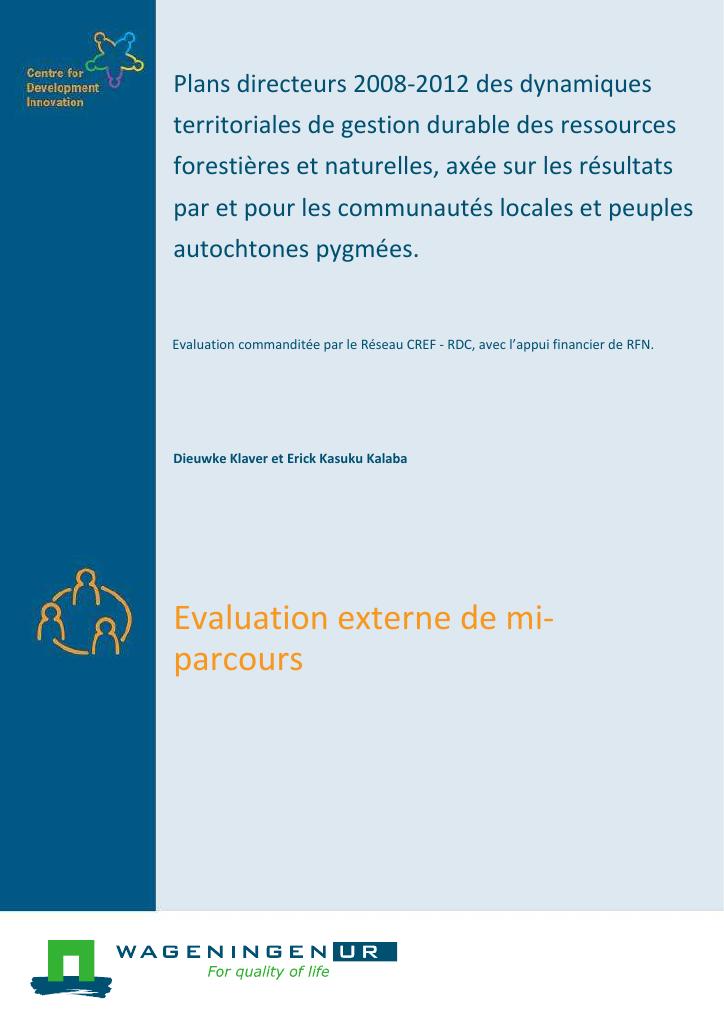Evaluering
Evaluation externe de mi-parcours. Plans directeurs 2008-2012 des dynamiques territoriales de gestion durable des ressources forestières et naturelles, axée sur les résultats par et pour les communautés locales et peuples autochtones pygmées
Background: Réseau CREF is a network of some 30 environment and development organizations in the province of North Kivu. The Rainforest Foundation has supported the network since 2005, when it started a participatory process including local communities and other actors, which resulted in a master plan. The objective of the plan is to contribute to poverty reduction, peace and good governance in North Kivu through sustainable management of forests and other natural resources. The first five year term of the plan was launched in 2008.Purpose/objective:General objective: Give the stakeholders in Réseau CREF's master plan 2008-2012 an opportunity to capitalize its current potential and optimize its chance of successSpecific objectives: - Midterm assessment of output, outcome and perceptible impact of the plan- Assess the relevance and sustainability of the activities conducted as part of the plan, as well as the degree to which the plan has been accepted as general guidelines for territorial politics in North Kivu- Assess the organizational performance of the members of the Réseau CREF network, of other entities (e.g. territorial committees), and of the network itself, and assess the efficiency of the network's work procedures.- Capitalize lessons learned so far, and formulate recommendations for the remaining 24 months of the plan (Jan 2011 – Dec 2012).Methodology:First phase: planning of the evaluation; document analysis; development of a data collecting manual.Second phase: collection of data in the field by means of interviews, direct observation, and focus groups. Target groups: local communities and indigenous peoples; Réseau CREF's member organizations; territorial committees; the executive, control and administrative organs of the network; the network's public partners; the member organizations' technical and financial partners. The evaluators had telephone interviews with Réseau CREF's international partners.Third phase: processing and analysis of the collected data.Fourth phase: a workshop conducted by the evaluators, where Réseau CREF discussed and validated the evaluation results. Measures were taken to reorient the master plan.Key findings:- The most successful implementation of components in the master plan are the participative management of forests and protected areas (participatory mapping; development of local community managed forests; solution of conflicts between the national parks and the neighbouring communities); the improvement of indigenous peoples' situation (land rights; access to the legal system); the institutional management of the master plan (transparent management; continuous capacity building of member organizations). These components have a society transforming character, as they are based on a change of mentalities and of power relations (between communities and authorities, and between different categories of the communities). They are thus rather long term, and only timid, not yet sustainable, results and impacts can be seen.- More small scale activities aiming at improving people's living conditions already in the short term have not had any significant impact. The main reasons for this are insufficient technical competence and lack of follow-up. Réseau CREF's member organizations have not possessed the required competence to successfully implement the activities, and financial resources have been scarce.- Réseau CREF was found to be seen as a relevant structure presenting relevant solutions. The secretariat of the organization with its transparency and good governance is exemplary, and it is considered a serious and competent actor in the region.- The territorial master plans are highly relevant and represent the concerns and priorities of the local communities which depend on the forest. They are also good tools for channelling funds and harmonizing interventions. However, for the time being these plans are not being applied by the authorities or other actors.- Réseau CREF have several weak member organizations, and there is a tendency for members to consider the network as a donor. Considerable efforts have been invested in capacity building of the network members, but there are limited results due to the difficult financial situation of the organizations and brain drain. In the fourth phase of the evaluation, different network scenarios were discussed, and Réseau CREF opted for reinforcing its role as a lobby network. - Major challenges for the network: lack of funding; overburdened secretariat; too demanding planning and program cycle; lack of strategic leadership.Recommendations:- Réseau CREF should to do more to promote the use of the territorial master plans and the results of the participatory mapping activities among territorial administrators and other actors in North Kivu, as well as using the plans to attract potential donors.- The secretariat spends most of its time on day to day management of the network's projects. It needs to find time to develop strategic leadership, so that it can mobilize financing for the different components of the master plan, make the envisaged lobby network operational, develop a gender strategy, and find ways for the members to learn from one another.- It is necessary to reflect upon how to make member organizations contribute more to the network and how to enable it to become a lobby network- The network focus on changing policies and the context of people’s lives in the long-term, rather than building schools, etc. Some feel the network should work more directly to improve people's living conditions. - The concept of Réseau CREF's territorial committees is useful, but must find ways to make them more operational. Since the network has acquired a supervising role in the ongoing drafting of the provincial forest regulation edict, the evaluators suggest the network maintain only one of the two different structures of territorial committees.Comments from the organisation, if any:Nothing additional.
